Abiteboul: What Caterham need now is sparkle!
Caterham are determined that 2014 will be the year when they finally break free from the back of the grid and start to seriously mix it in the mid-field. A year into his role as team principal, Cyril Abiteboul has strengthened the infrastructure of the Anglo-Malaysian squad and has secured an exciting new driver line-up in F1 returnee Kamui Kobayashi and Swedish rookie Marcus Ericsson. With the new CT05 testing for the first time in Jerez this week, we caught up with Abiteboul to get his take on the coming season and more…
Q: Cyril, one year as team principal of Caterham. Can you talk us through your journey so far?
Cyril Abiteboul: It’s been challenging, that’s undeniable, quite possibly a bigger challenge than I could have imagined, and it’s fair to say my first year did not end as I or the team would have liked. However, we have achieved a lot behind the scenes at the factory and with our partners that gives us reason to be positive about the future. We have made significant improvements across the whole team since I joined, improvements in the efficiency of our business, in our design and production capabilities and in strengthening every area of the team. But, unfortunately, these are not sexy changes, these are not what you see on TV, you only see performance and that was not good enough in 2013. But we continue to progress at a sustainable rate and I am excited about what lies ahead, particularly as F1 enters a new era which will be challenging for everyone in the sport.
Q: Finishing last in the standings - what does that mean? Not in terms of extra funds, but in terms of motivation?
CA: It clearly impacted the morale of the team. But it is not very different from what the team has experienced since it first started back in 2009, travelling around the world, working all day and all night knowing that it will be finishing in the last few places without being able to really fight, without really being part of the game. It is the reason why this is the year when we need to put a stop to this, to really take control of our future. However, finishing last actually opened our eyes to the very simple fact that things must change. Now we’re into 2014. Last year is done. We want to start the new F1 era in a position that means we’re not relying on luck and that’s a very strong motivating factor for everyone in the team.
Q: Caterham developed well over the course of last season and still it was not possible to overtake Marussia in the standings - why? What was missing?
CA: I think the main thing that was missing was luck. We did everything we could to put us in the right place to take advantage of any opportunities that came our way, and we came very close to registering that 13th place, but we needed a freak result to help us get back 10th overall, and in 2013 it just didn’t come our way. There was a huge effort at the factory to help us overtake them by the fourth race, and we maintained that performance gap for most of the rest of the year, but we just didn’t have the luck that came our way in 2012 in the final laps of the final race, which should certainly have been a warning to the whole team.
Q: What was your impression of your two drivers? One rookie and one with a year’s experience - was that a bit too blue-eyed?
CA: Perhaps - but everything looks different with hindsight. I believe, bearing in mind where we were at the start of 2013, we made the right decision with Charles (Pic) and Giedo (van der Garde), and had Giedo finished one place higher in Hungary, or Charles in Korea, last season would look very different. In the end, we took two young drivers and they did the best job they could with the package we gave them.
Now, in 2014 we have an almost all-new driver line-up, with Kamui Kobayashi and Marcus Ericsson in the race seats, and Robin Frijns as reserve, and Alexander Rossi returning as our other reserve when his GP2 commitments allow. We unveiled Kamui, Marcus and Robin last week at Leafield and the reaction to our line-up has been exactly what we hoped for. Bringing Kamui back to F1 was always going to be a popular move. He is one of those rare drivers who is universally liked by the fans, partly because he’s an out and out racer, but also because he’s engaging, funny and determined to show he shouldn’t have had a year out of F1. Tony’s talked about the passion he saw in Kamui’s eyes the first time they met, and that’s obvious. He can’t wait to start driving again and his passion is infectious - just ask any member of our team how they feel about having him behind the wheel and they all smile, they all say how good it is for us to have someone with his experience, skill and passion.
Marcus is the second driver we’ve taken from GP2 to F1. His track record in the lower formulae speaks for itself - his GP2 career comprises of three wins, 13 podium finishes, two pole positions and one fastest lap - the sort of statistics that show clearly he can mix it at the highest levels of motorsport. He’s immediately settled into the team and has impressed everyone with how calmly he’s approaching his debut season in F1. That’s going to be an important characteristic this year, being able to remain calm under the intense pressure all drivers face, and with the experience we have of helping drivers adapt to F1 from GP2 or World Series by Renault, we’re confident Marcus is in the right place to make a very positive impression on F1. As reserves we have Robin Frijns and Alexander Rossi. They’ll share that reserve role over the season, Robin taking over whenever Alexander has a GP2 weekend, and Alexander for all the non-GP2 races.
Robin’s another very exciting young driver to add to our roster, and we’re very interested to see how he develops in the simulator and on track over the course of the season. I have to say, from what we’ve already seen, he’s clearly very quick - that’s never been in doubt as most of the paddock would agree he has natural pace to rival anyone. What we’ll give him this year is a program that will help him fine tune the overall package, preparing him for a possible race seat in the future when we believe he’s completely prepared to take on a season.
Alexander completes the line-up and this is a big year for him. Unlike last year, he will be competing in GP2 right from the start of the season, so he has a very good opportunity to fight for the championship from the first race. He showed last year that when we give him a car he can really fight with he can dominate a race. Look at his performance in Abu Dhabi for proof of that - now we want more of the same throughout the whole year. He’ll combine GP2 with his F1 reserve role, so he’ll continue his F1 education throughout the year, and he’ll play a key role back at the factory with the simulator program we’ve mapped out for him, making the most of an engineering tool that will be critical to track performance this year.
Q: You have said in the past that drivers should contribute financially to their team. Sounds like you are willing to sacrifice talent for funds. Can you explain your reasoning?
CA: I think that’s an unfair reading of what I said. The fact is that no driver reaches F1 without talent. Sure, there are obviously drivers who are quicker than others, but nobody will be on the grid in Australia with money but no talent. But it is also a fact that budget is at the core of motor racing, from karting to Formula One. Everyone who wants to race should be mindful of that fact and recognize the immense difficulty in raising the funds needed to exist and be competitive, and at the very least not criticize drivers who do contribute to their teams. Besides, there are so many ways to contribute - take a look at what Kamui has done with his fans. That is a good lesson.
Q: How much is Caterham’s development being hindered by the lack of a budget cap? Wasn’t that one reason Caterham entered F1 racing - with the understanding that there would be a more level playing field?
CA: Our shareholders started this team when serious budget cap proposals were in place, but they have never materialised. A budget cap is back on the agenda, but it is too early to say whether it can really work in practice. However, I think it’s fair to say that we definitely need to find ways to reduce the need to spend to race competitively, or we are going to price the sport out of business. Or see more measures like the contentious double points for the final race. I personally believe that a budget cap would not be enough, and that additional measures will be required to have a real impact in the timeline that changes are needed.
Q: The FIA is looking for a 12th team that could join either in 2015 or 2016. From Caterham’s experience, what would be your advice to a would-be F1 team?
CA: It’s difficult to know where to start. Probably the main advice I would give would be to say double your budget and then double it again. Then you might be close… oh, and pick the location of your team base right first time.
Q: And after the 2013 experience - what’s the plan for 2014?
CA: Our 2013 championship was decided in race two in Malaysia. This year more than ever, we need to be ready by race one. Lots of things might be decided in the early part of the season again and in 2014 we should also enjoy the benefit of a healthy development platform thanks to our program with TMG and the increase of our CFD capability. An aggressive recruitment program has also taken place over the winter to improve the quality and experience of our team in key areas so now we have all the right ingredients. What we need now is the sparkle!
Next Up
Related Articles
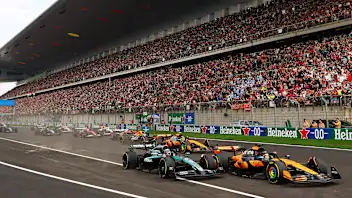 Tickets on sale for 2026 Chinese Grand Prix
Tickets on sale for 2026 Chinese Grand Prix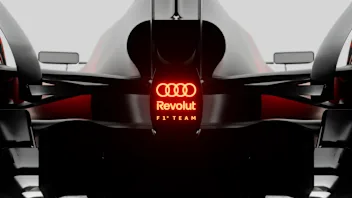 Audi announce team name and global launch date for 2026 challenger
Audi announce team name and global launch date for 2026 challenger 3 inspiring individuals share their paths to working in F1
3 inspiring individuals share their paths to working in F1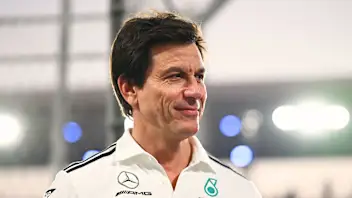 Wolff calls Abu Dhabi ‘mediocre’ but ‘pleased’ to finish P2
Wolff calls Abu Dhabi ‘mediocre’ but ‘pleased’ to finish P2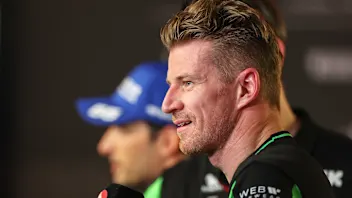 Hulkenberg pleased to score points in Sauber’s final race
Hulkenberg pleased to score points in Sauber’s final race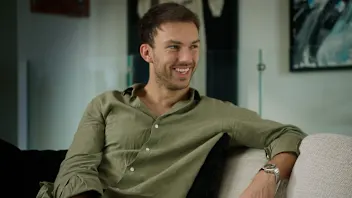 An exclusive look into Pierre Gasly's off-track life
An exclusive look into Pierre Gasly's off-track life